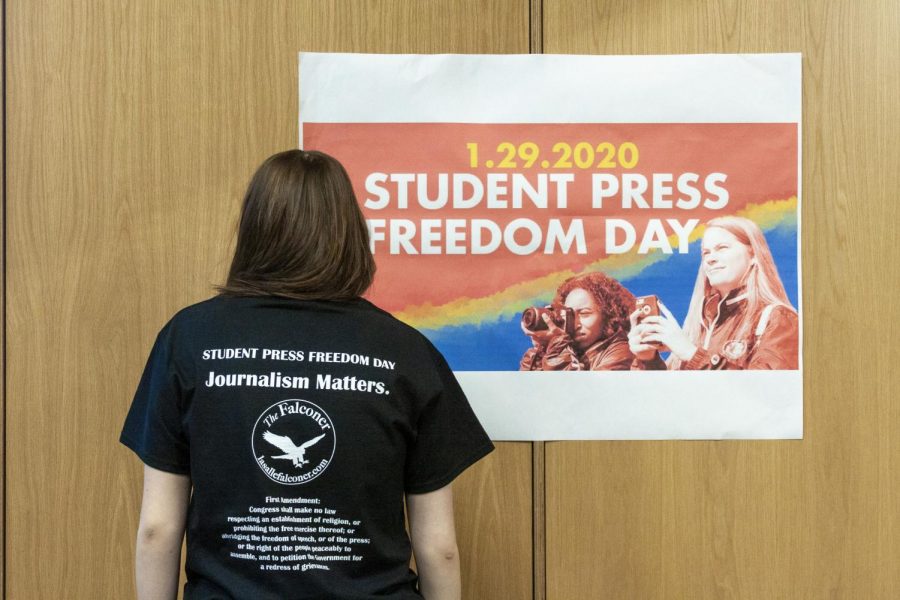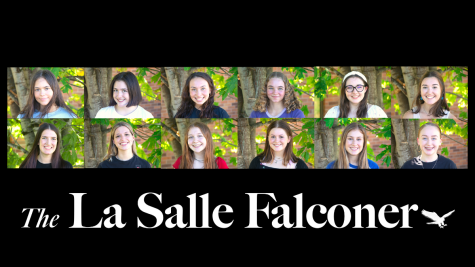Editorial: Student Press Freedom Matters
Student Press Freedom Day supports student journalists’ independence from censorship.
January 29, 2020
For some student publications in the United States, students are able to practice journalism with no restrictions. They are given a license to be curious — meaning they are free to ask important questions, expose issues within their communities, and address controversial topics. Many other student publications, on the other hand, face censorship and limitations in their ability to act as journalists.
Today, Jan. 29, marks Student Press Freedom Day, which, according to the Student Press Law Center, “is a national day of action when we celebrate the contributions of student journalists and highlight the need to support their independence without censorship or threat to their advisers.”
The Falconer would like to honor and celebrate the independence we have been given by our school’s administration. We are lucky, as a student-run publication at a private Catholic school, to be able to maintain the press freedom that we do.
Student press freedom is limited in many schools throughout the country, despite the rights granted in the First Amendment, which states that Congress cannot abridge or limit the freedom of the press.
In most states, student press freedom is restricted by the ruling of the Hazelwood School District v. Kuhlmeier case of 1988, during which three high school student journalists, led by Cathy Kuhlmeier, sued their school district in Missouri.
They claimed infringement on their First Amendment rights after the principal of their school had removed articles that involved the topics of divorce and teen pregnancy from their publication, the Spectrum.
Eventually, the case made its way to the Supreme Court, which ruled that schools could place far greater restrictions on student free expression. This decision overruled its previous finding in the 1969 Tinker v. Des Moines case, which established that “it can hardly be argued that either students or teachers shed their constitutional rights to freedom of speech or expression at the schoolhouse gate.”
This legal defeat of the Spectrum reporters is viewed as a major setback in the eyes of student press freedom supporters everywhere, and still restricts many student journalists in schools across the nation. Some states, however, have moved to protect student press freedom with legislative measures called New Voices laws, which roll back the decision made in Hazelwood v. Kuhlmeier.
Currently, 14 states have laws to provide sweeping protections for the First Amendment rights of student journalists, including Oregon. More than a dozen other states have active movements in support of New Voices laws, while the rest remain open to censorship.
Public schools in states with New Voices laws are protected from the implications of the 1988 Supreme Court ruling. But even in these states, private schools like La Salle, on the other hand, are not required to abide by state or federal laws regarding free press rights, with the only exception being California.
Operating within a private school, the Falconer editorial board is deeply appreciative of the press freedom we have been given by La Salle’s administration, who has been supportive of our publication’s independence from the school establishment and respectful of our policies against censorship and prior review.
That being said, student press freedom nationwide is lacking. There should be no form of infringement on the First Amendment rights of publications anywhere, and many student journalists around the country struggle to deliver truth to their communities due to censorship.
When student journalists are restricted from seeking truth and reporting it, it makes for less informed community members, untold stories, and lack of recognition where it’s due. Issues that should be brought to light are left in darkness, and windows for discussion are closed off.
Journalism matters. Student journalism matters. It’s time for a free student press to be the standard everywhere.






Mario De Ieso • Jan 30, 2020 at 10:56 am
I recommend the Falconer often to people both inside and outside our community not only because it represents so well the place where I work and people I work with but also because it captures so well the news and trending contemporary topics…that and its a go to for new music. Keep up the great work!
Tom McLaughlin (aka Mr. Mac) • Jan 29, 2020 at 8:10 pm
I’m proud of The Falconer staff for the quality reporting and exposes it does in service to the La Salle community. I, too, am grateful for the support you receive from our Administration. Keep up the excellent and essential work, Falconer staff!